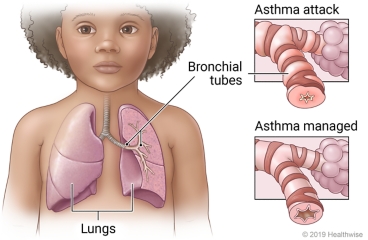Overview

During an asthma attack, the airways swell and narrow. This makes it hard for your child to breathe. Severe asthma attacks can be dangerous. But you can help prevent these attacks by keeping your child's asthma under control and treating symptoms before they get bad. Symptoms include being short of breath, having chest tightness, coughing, and wheezing. Treating these symptoms can also help you avoid trips to the emergency room.
If your child has any problems or new symptoms, get medical treatment right away.
Follow-up care is a key part of your child's treatment and safety. Be sure to make and go to all appointments, and call your doctor if your child is having problems. It's also a good idea to know your child's test results and keep a list of the medicines your child takes.
How can you care for your child at home?
Follow an action plan
- Make and follow an asthma action plan. It lists the medicines your child takes every day and will show you what to do if your child has an attack.
- Work with a doctor to make a plan if your child doesn't have one. Make treatment part of daily life.
- Tell teachers and coaches that your child has asthma. Give them a copy of your child's asthma action plan.
Take medications correctly
- Your child should take asthma medicines as directed. Talk to your child's doctor right away if you have any questions about how your child should take them. Most children with asthma need two types of medicine.
- Your child may take daily controller medicine to control asthma. This is usually an inhaled steroid.
- Your child will use a quick-relief medicine when they have symptoms of an attack. This is often an albuterol inhaler.
- Make sure that your child has quick-relief medicine with them at all times.
- If your doctor prescribed steroid pills for your child to use during an attack, give them exactly as prescribed. It may take hours for the pills to work. But they may make the attack shorter and help your child breathe better.
Check your child's breathing
- If your child has a peak flow meter, use it to check how well your child is breathing. This can help you predict when an asthma attack is going to occur. Then your child can take medicine to prevent the asthma attack or make it less severe. Most children age 5 and older can learn how to use this meter.
Avoid asthma triggers
- Keep your child away from smoke. Do not smoke or vape around your child or in your home, and avoid being around others who are smoking or vaping.
- Try to learn what triggers your child's asthma attacks. Then avoid the triggers when you can. Common triggers include colds, smoke, air pollution, dust, pollen, mold, pets with fur, cockroaches, stress, and cold, dry air.
- Make sure your child is up to date on their COVID-19 and other immunizations and gets a yearly flu vaccine.
When should you call for help?
Call 911 anytime you think your child may need emergency care, and keep using your child's asthma action plan until help arrives. For example, call if:
- Your child has severe trouble breathing.
Call your doctor now or seek immediate medical care if:
- Your child's symptoms do not get better after you've followed the asthma action plan.
- Your child has new or worse trouble breathing.
- Your child's coughing or wheezing gets worse.
- Your child coughs up yellow, dark brown, or bloody mucus (sputum).
- Your child has a new or higher fever.
Watch closely for changes in your child's health, and be sure to contact your doctor if:
- Your child needs quick-relief medicine on more than 2 days a week (unless it is just for exercise).
- Your child coughs more deeply or more often, especially if you notice more mucus or a change in the color of the mucus.
- Your child is not getting better as expected.
Where can you learn more?
Go to http://www.healthwise.net/patientEd
Enter D604 in the search box to learn more about "Asthma Attack in Children: Care Instructions".
Current as of: September 29, 2025
Author: Ignite Healthwise, LLC Staff
Clinical Review Board
All Ignite Healthwise, LLC education is reviewed by a team that includes physicians, nurses, advanced practitioners, registered dieticians, and other healthcare professionals.

